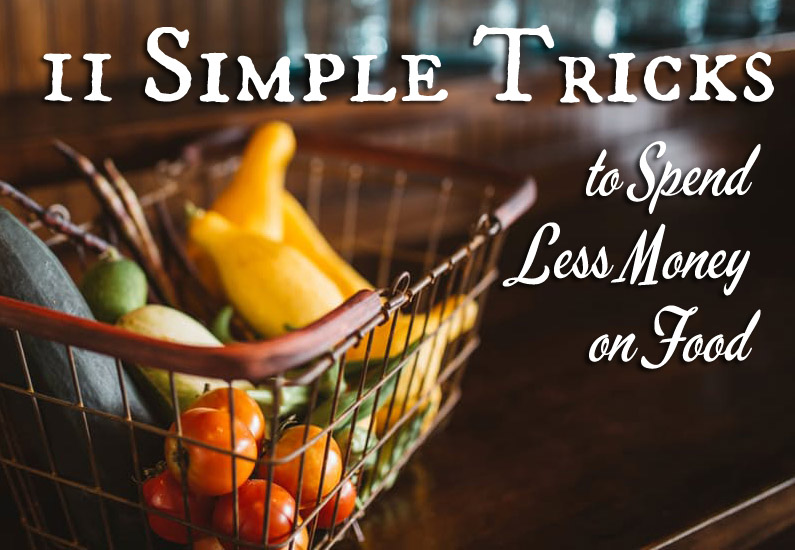One of the hardest places to trim your budget has to be in the grocery section. Eating is a necessity, and it’s possible to spend an exorbitant amount of money at the grocery store. But it certainly doesn’t have to be that way. If you’re looking for a way to save a bit of money without sacrificing too much, then check out these 11 tips:
1. Stop eating out
Eating out is expensive than you probably realize. Even if you only eat out once a week, it adds up quick. Don’t believe me? Take a look at your grocery bill and figure out how many meals you’re getting out of that, then look at how much you’re spending on one meal at a restaurant. I guarantee you’ll be surprised. Most of my homemade meals cost between $3-$6 per meal, and most meals will go for at least two days.
2. Make a menu
Sit down every time you get paid and make a meal with the number of meals between now and your next check. Write down everything you’re going to eat (lunches and breakfasts included) and make a grocery list. Take stock of what you have and see what you can make. This way, you get two benefits: you only shop once, and you’re less tempted to eat out as you know you have food at home.
3. Buy in bulk
It might sound counter-intuitive at first, but if you buy in bulk or buy larger portion sizes, you can save up in the long run. For example, I’ll buy the 5 lb ground hamburger instead of individual pounds, and then separate and freeze it myself. Sure, that bill is a bit more expensive, but it means I’m saving money later. The same goes for things like pasta, which can keep and are cheaper in bulk.
4. Eat more leftovers
The easiest way to make your food budget go longer is not to waste things. Plan leftovers in your menu, and think of ways to reuse things you know you’ll have leftover. Remember that you don’t have to just reheat and eat it exactly the same—make the dish into something else so it doesn’t get old!
5. Track your spending
When you’re at the grocery store, write down the prices of everything on your list next to the item, rounding up when you can to account for tax. This way you’ll not only avoid a nasty surprise at the register, but also know exactly where all your money is going and be able to decide on things. Do you really need that $3 package of cookies, or should you buy an extra pack of butter on sale?
6. Stop drinking soda
If you’re a regular soda drinker (meaning you have two or more a day) then you’d be amazed how much money you’re spending on soda. Although it seems like a small thing, cutting out that extra can really go a long way. As a bonus, it’s also healthier!
7. Use less meat
Let’s be honest here: meat is really expensive. In fact, it’s probably where most of my grocery money goes. So, to make it go further, I use less meat in my cooking. Instead of using a whole pound of meat in my spaghetti, for example, I use half a pound and the same amount of sauce. This way, I get twice as much out of it, and you can’t really taste that much difference. There are some recipes where this isn’t possible, but many times you can use less meat and more fillings (like rice, pasta, beans, etc) to make your budget and meat go further.
8. Eat seasonal foods
It’s a fact that foods that are in season are going to be less expensive than foods which are out of season, and they’ll taste better too. So you’re not only saving money, but getting more variety and better taste. What’s not to love?
9. Compare prices
Places like Walmart and Price Cutter make their money because they’re just so convenient. Why wouldn’t you shop at one place where you can get everything instead of driving all over? Simple: cost. Some places, like Aldi or even a farmer’s market, will have food for way cheaper, but you can’t get everything there. Stop paying extra simply so you have to drive less and compare prices. You’ll be amazed how much you can save simply by spending a little more time.
10. Avoid premade and freezer food
Generally speaking, anything that is pre-made—be it in the freezer aisle or on a shelf—is going to not only be more expensive, but taste worse than if you made it at home. In fact, most pre-made things you can make at home with just a bit of creativity and experimentation. It will take more effort, but you’ll get better quality and more quantity for your money. Don’t believe me? Try Googling a recipe for your favorite boxed or pre-made food, and I guarantee you’ll find an easy homemade alternative.
11. Buy generic brands
When you buy name brand foods, most of the time what you’re paying for is essentially advertising. After all, ketchup and pasta really are all the same, no matter who is making them. Be sure to check carefully and compare the prices too—some companies, like Walmart, have recently begun to sell their generic brands for almost more than the name brands! Always look at the top and bottom shelves as the cheaper items tend to be outside of eye-level.
What tips do you have for saving money on groceries? Share with me below!! Happy shopping!





